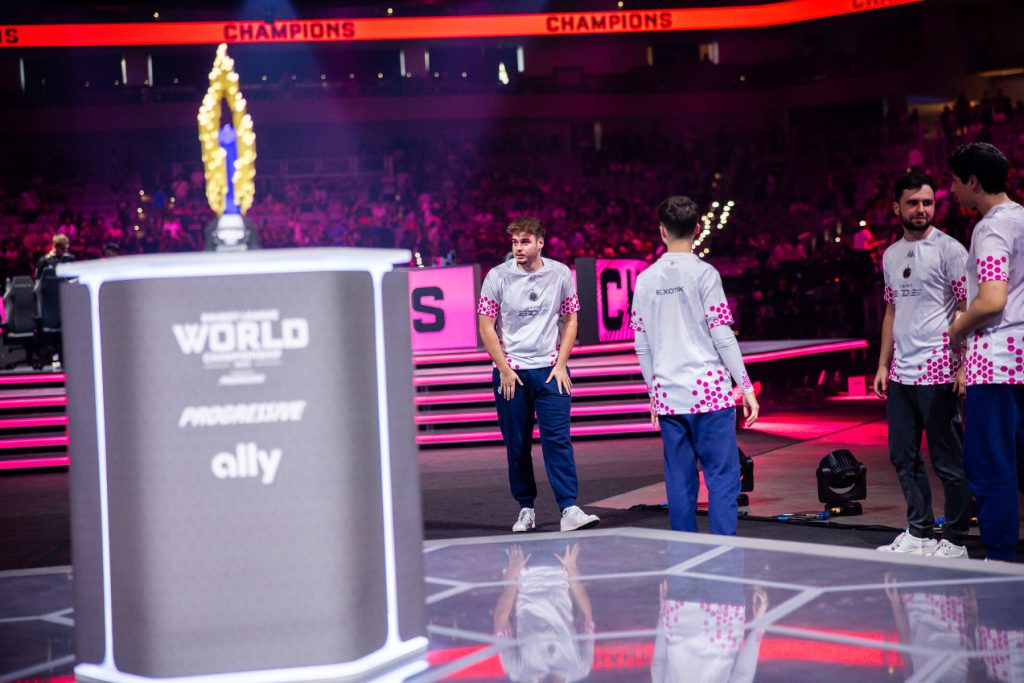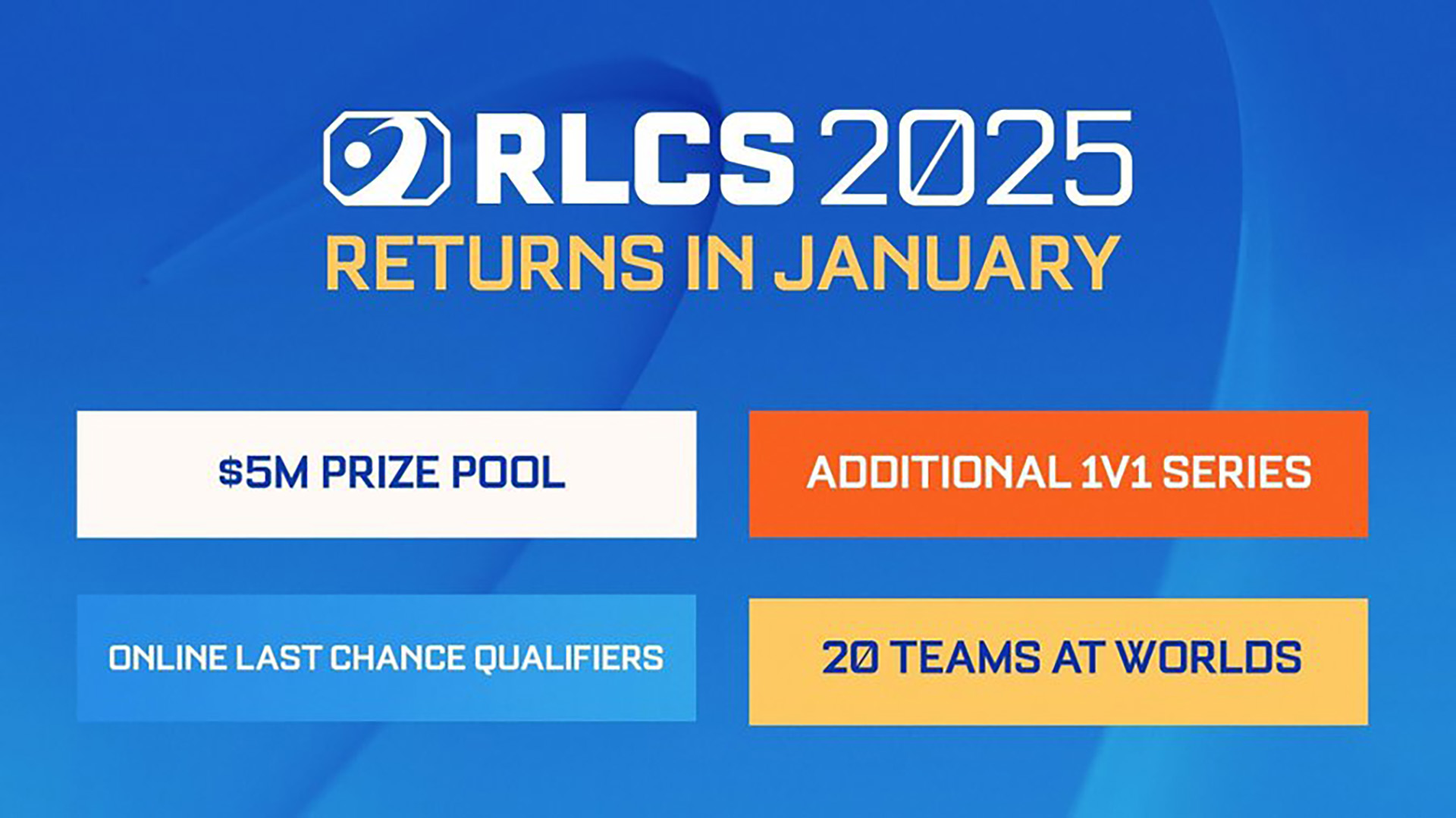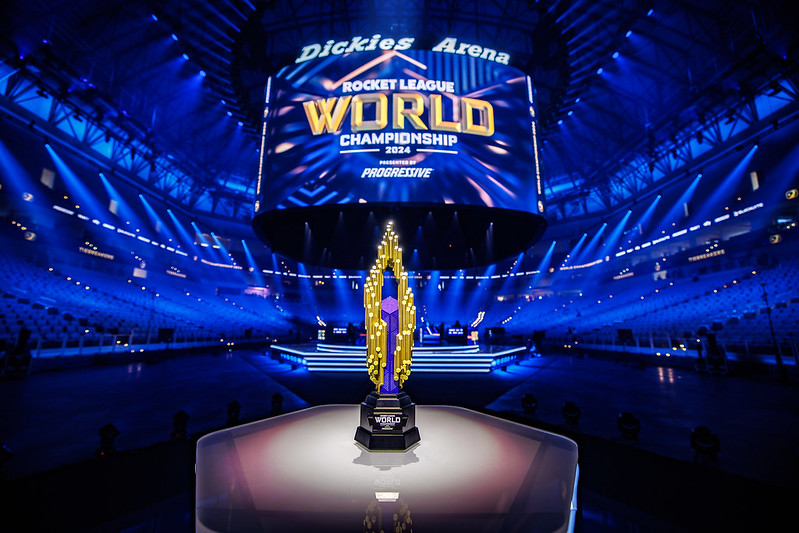
Sustainability in esports is a constant discussion. From layoffs across esports media to teams shutting down divisions to refocus its efforts on a select few games, the esports industry is on a course correction to achieve stability.
Many esports ecosystems have struggled with sustainability issues which has led to major changes in structures. A great example of this is Overwatch League. Now it seems that the Rocket League ecosystem, specifically the RLCS, is at the forefront of the sustainability conversation.
The topic of sustainability in Rocket League esports rose to prominence last month when Team BDS, a Swiss esports organisation and this year’s RLCS World Champions, announced that it was “reviewing its position and investment” in the competitive scene. Citing a lack of long-term profitability, Team BDS’ championship winning players have since left the organisation, the team’s focus will shift to younger talent and it will support the scene through other initiatives.
Team BDS’ announcement was followed by a wave of statements from TSM, G2 Esports and more about the current esports sustainability issues in Rocket League. It’s typically rare to see major organisations and stakeholders publicly comment on an esports ecosystem’s sustainability, with most also emphasising their intention to remain involved in the scene.
So, what are these issues? Is something being done to fix them?
One of the biggest complaints from esports stakeholders comes down to profitability. Right now, the financial need to run a competitive Rocket League esports division costs too much. Some organisations, such as G2 Esports, have to rely on major sponsors to make it a viable opportunity.
It has also been echoed that there isn’t currently enough support from Rocket League’s publisher Psyonix as well as RLCS tournament organiser BLAST to sustain an elite Rocket League roster in its current climate.
“The support we get from the publisher and the tournament organiser of this scene only covers 20% of the costs to operate a Tier1 roster,” said Alban Dechelotte CEO of G2 Esports on Twitter/X.
It’s important to note that Psyonix does provide revenue opportunities for many organisations competing in the RLCS through its in-game item initiative. In April 2019, the company introduced a revenue-sharing esports shop that would give select teams a cut of the earnings from branded decals.
Initially, the pilot programme saw 11 teams receive 30% of the revenue received from purchases of these items. In 2024, over 30 organisations debuted new custom decals and player banners.
When asked about whether Rocket League’s revenue sharing system helps ease sustainability concerns, Shawn Pellerin, CEO of Spacestation Gaming, told Esports Insider: “It did in previous years, but not currently.”

Another esport that has a similar revnue system is Counter-Strike, with its Major stickers and autographs. Whilst the exact percentage that Valve takes isn’t public, teams and players make money from the stickers capsules that contain team logos whilst players also get a cut from capsules that contain their autographs. The major difference is that teams are selected for Rocket League’s revenue system as opposed to Counter-Strike where teams have to qualify for a Major in order to be eligible.
As such, RLCS’ model is more akin to VALORANT, which launches digital items for its Partner teams. In 2023 Riot Games distributed more than $33m (~£26.30m) to teams from digital item revenue.
Whilst this method has been proven to be effective, it is worth noting that in-game revenue heavily depends on the growth of the scene and the games popularity as an esport. Counter-Strike has a long history in the esports space as a franchise. Meanwhile, VALORANT is one of the fastest growing esports in recent years. Whilst Rocket League has an undoubtedly passionate fan-base, it fails to reach the viewing figures of tier-one esports, which can peak at over 1m viewers.
This year, tournament organiser BLAST announced raised prize pools for the RLCS in 2025 to $5m (~£3.7m), an increase of $700,000. However, organisations usually only get a small percentage of prize pools due to player contracts. Other changes that have been made for the 2025 season include working with third-party tournament organisers to provide more opportunities for players and teams.

“The only thing we can do as an organisation going into next year is adjust according to the current economics of the scene, that is the only control we have to fix the problem,” added Pellerin.
Another major hurdle within Rocket League esports, is that the cost of running a team within the scene has increased.
He explained: “Every year the cost of teams increases, but the potential revenue return was drastically decreasing and it’s hit the point where the spread is so great that it doesn’t make sense to continue for some teams.”
Rocket League looking unappetizing to esports organisations could not have come at a worse time, especially when you consider the general state of the industry and the fine margins that many companies in the industry operate by. There are less sponsors and investors coming into the scene, meaning that esports organisations are currently focusing on consolidation rather than growth and exposure.
Ultimately, creating a sustainable ecosystem is not a new dilemma, nor is it an issue that is just within Rocket League.
Other esports such as North American Counter-Strike have also suffered greatly, largely due to a lack of tournaments and support. This has led to less and less opportunities for organisations and players— with many of the latter leaving for VALORANT.

Despite the issues raised, Rocket League esports continues to stay steady in other areas. In 2023 the esport broke its peak viewership record with 468,292 viewers. This year it had a relatively similar peak of 435,503, putting its popularity on par with the likes of Street Fighter and PUBG according to Esports Charts.
Esports Insider reached out to Psyonix to discuss concerns over Rocket League’s sustainability in esports.
A spokesperson from Epic Games, Psyonix’s parent company, shared the following statement: “Epic is supporting Rocket League Esports and RLCS with a reset of the format for 2025 that introduces a new 1v1 offering as well as Last Chance Open Qualifiers, an increased prize pool year over year to $5m, and more ways for players to compete in the off-season – including Off-season Opens, custom licences with third party tournament organisers to build new events and more community tournaments featuring Rocket League.
“We don’t have any specific details to announce yet, but we’re also working directly with teams who participate in the Rocket League competitive ecosystem to outline additional plans for 2025.”
Regardless of what changes the next season of RLCS will bring, this situation has made one thing absolutely clear. The passion of those working within and around the Rocket League esports system is immense. Instead of silently slinking away these brands have spoken up to try and improve the esport. Team BDS, G2 Esports, TSM, Resolve, Spacestation, Gen.G and more clearly want the Rocket League scene to succeed by working through the issues that have been raised.
